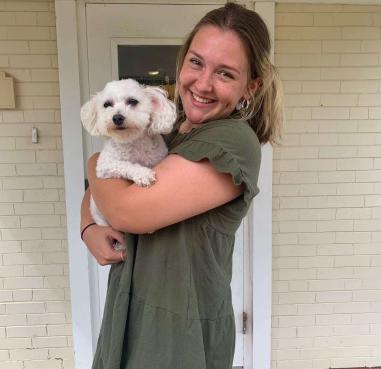Emotional support animals: companions on campus.

Emma Thul with her ESA, Star, outside of the Kappa sorority house. Taken by an unknown friend.
September 14, 2022
An emotional support animal (ESA) is a companion animal, most often a cat or dog, that helps alleviate one or more effects of someone’s disability. The first step for people wanting to own an ESA is contacting Karen Lynch, the director of Simpson’s Student Accessibility Services (SAS).
From there, students provide documentation of their disability, often official letters from care providers stating the diagnosis and its impact, before having a meeting scheduled for further discussion with Lynch.
Based on the documentation provided and the interview, SAS will decide if an animal can be registered as an ESA. Guided by the Americans with Disabilities Act and the Fair Housing Act, students who have their ESA approved will meet with Residence Life and SAS to review the policies and responsibilities of their animal.
“It’s really important for people to understand that there’s a lot that goes into getting an ESA,” said Lynch.
Students should be prepared to pay for their pet’s medical care and happiness, as well as take care of both themselves and the ESA.
Students with an ESA that isn’t hypo-allergenic will be subject to a $150 cleaning fee when they move out of their dorm. Each person is allowed one ESA and must have proof of their rabies vaccine. It is also recommended for the animal to be neutered or spayed.
ESAs shouldn’t be mistaken for service animals. While a service animal is trained to perform a specific action or task, an ESA is more of a companion. Another key difference is rules regarding the animals. While a service animal is allowed to go anywhere that its owner is allowed to go, an ESA is confined to the owner’s personal space. The only time an ESA is allowed outside is if it is harnessed or leashed, and it cannot enter any school buildings.
Heather Emery-Cunningham, Associate Director of Residence Life, is the final step of the process for confirming an ESA.
With an increase in social media awareness and a lack of information on how ESAs work, students may fall victim to various scams on the internet. Emery-Cunningham says that a site claiming to be able to register an animal as an ESA nation-wide is lying or confusing an ESA with a service animal.
Kappa Kappa Gamma resident Emma Thul owns a dog named Star. Star has helped Thul throughout her college days, supporting her emotionally and providing comfort. “I feel blessed that Simpson has this accommodation available to their students,” wrote Thul.
Thul has noticed a recent trend in ESAs on campus, hoping that people realize the difference between an ESA and a pet.
“It’s important to understand the responsibility and requirements before going out and adopting an animal,” said Thul.





